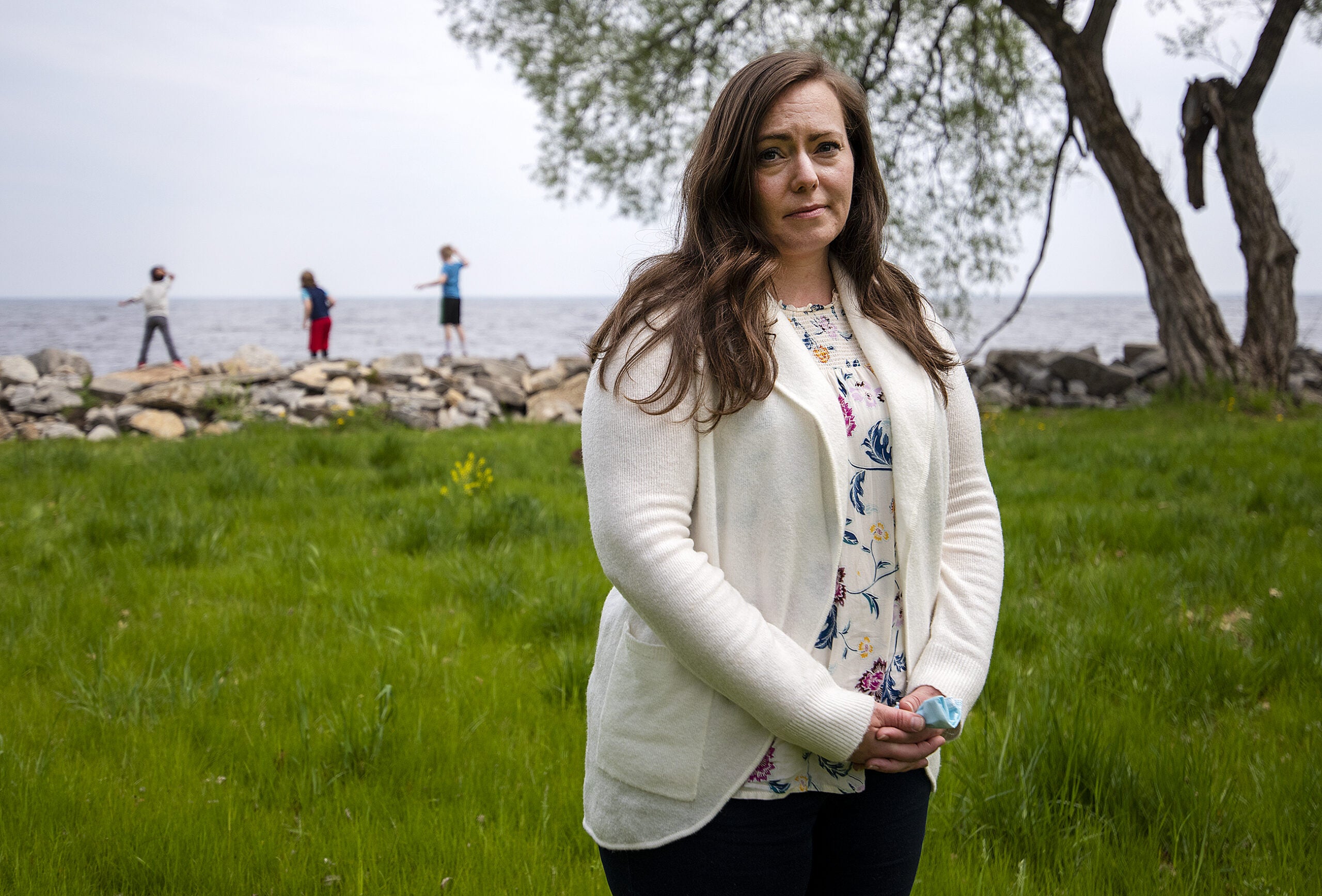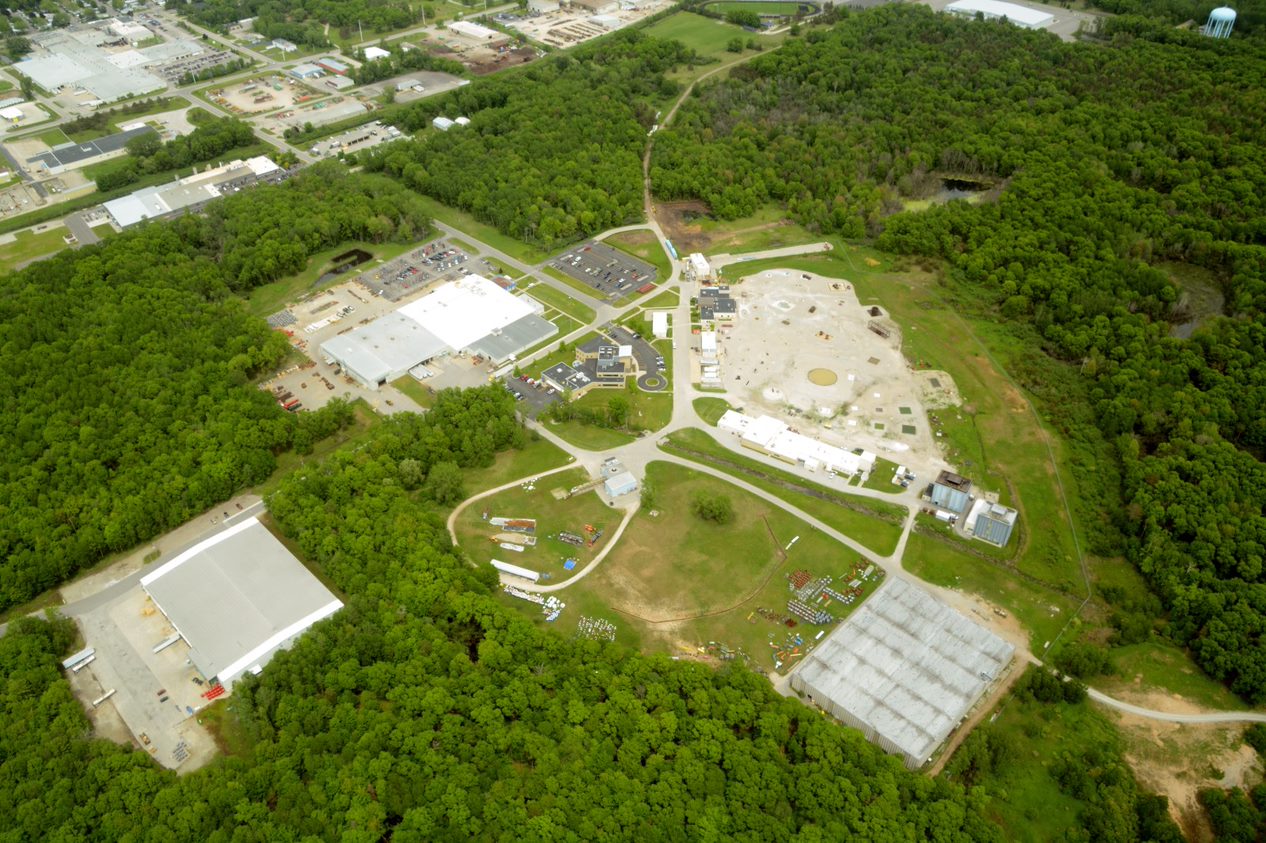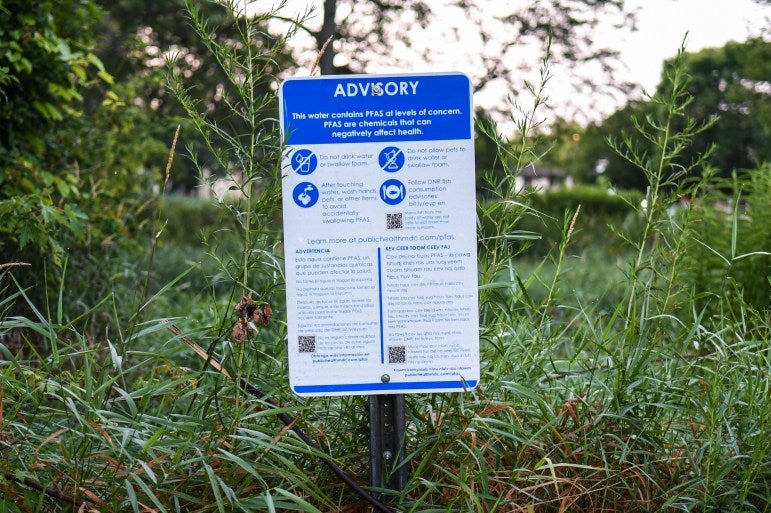On a warm spring day, Kayla Furton sat on the porch of her childhood home in the Town of Peshtigo just off Shore Drive overlooking Green Bay. The property has been in her family for decades, and to her it’s more than just a house.
“It’s the history — the land we grew up on,” said Furton. “It’s been so fun swimming in the bay with the kids and the playhouse that we have is the same playhouse I played in growing up.”

News with a little more humanity
WPR’s “Wisconsin Today” newsletter keeps you connected to the state you love without feeling overwhelmed. No paywall. No agenda. No corporate filter.
The mother of three and her husband Dean bought the home from her parents when they moved back to the area in 2016. Just a couple of years later, they learned their home was one of many in the area that have been affected by PFAS contamination.
“I fear that we don’t even know the full extent of the impact on the community and really, especially, on the kids,” she said.
Furton and around 140 other residents in the corner of northeastern Wisconsin have been drinking bottled water for years due to PFAS pollution of private wells. The contamination stems from the use of firefighting foam that contained the chemicals at Tyco Fire Products’ fire training facility in Marinette.
Residents knew little about PFAS when the Wisconsin Department of Natural Resources directed the company to investigate in the fall of 2017. Several years later, they’re no closer to a permanent source of clean, safe drinking water.
“It shouldn’t be a normal part of life that the water coming into your home isn’t safe,” said Furton.

PFAS are a class of thousands of harmful chemicals that have been linked to serious health issues including testicular and kidney cancers, fertility problems and thyroid disease. Often called forever chemicals because they don’t break down easily in the environment, PFAS substances are used in firefighting foam and everyday products like nonstick cookware and stain-resistant clothing.
Furton was diagnosed with thyroid disease a year after they moved back. She can’t say for sure that it’s due to the contamination, but residents reached a $17.5 million settlement with Tyco earlier this year over their exposure to the chemicals in private wells.
PFAS has seeped into so many parts of their lives that they even give filtered water to their pet chickens Gertrude and Mayo. While they would joke about it, research has shown a link between PFAS concentrations in hens’ drinking water and the levels detected in eggs.
“It just highlights the multiple paths of exposure,” she said.
Peshtigo was the first of many communities in the state to deal with pollution from PFAS. Eau Claire is one of the latest cities to find PFAS in municipal wells.
“Most of the municipalities (in Wisconsin) have not sampled their water, even at DNR’s request,” said Jeff Lamont, another Town of Peshtigo resident and a former hydrogeologist who worked as an environmental consultant on cleanups for decades.
The DNR has sampled about 90 public water supplies for PFAS, of which 5 percent have exceeded the state’s recommended health standard of 20 parts per trillion.
Gov. Tony Evers proposed funding to test all public water systems in his state budget earlier this year. But Republicans on the state Legislature’s budget writing committee stripped money for such an effort in addition to several other measures that would address the harmful substances. Lamont thinks the list of communities affected by PFAS will only grow once there’s widespread testing for the chemicals.
Lamont is critical of Tyco’s response to PFAS contamination from its Marinette facility, highlighting that the DNR referred the manufacturer and its parent company, Johnson Controls, to the Wisconsin Department of Justice for failure to report PFAS pollution in a timely manner.
“They let us drink this contaminated water for … three and a half years longer than we needed to because they didn’t report it,” said Lamont.
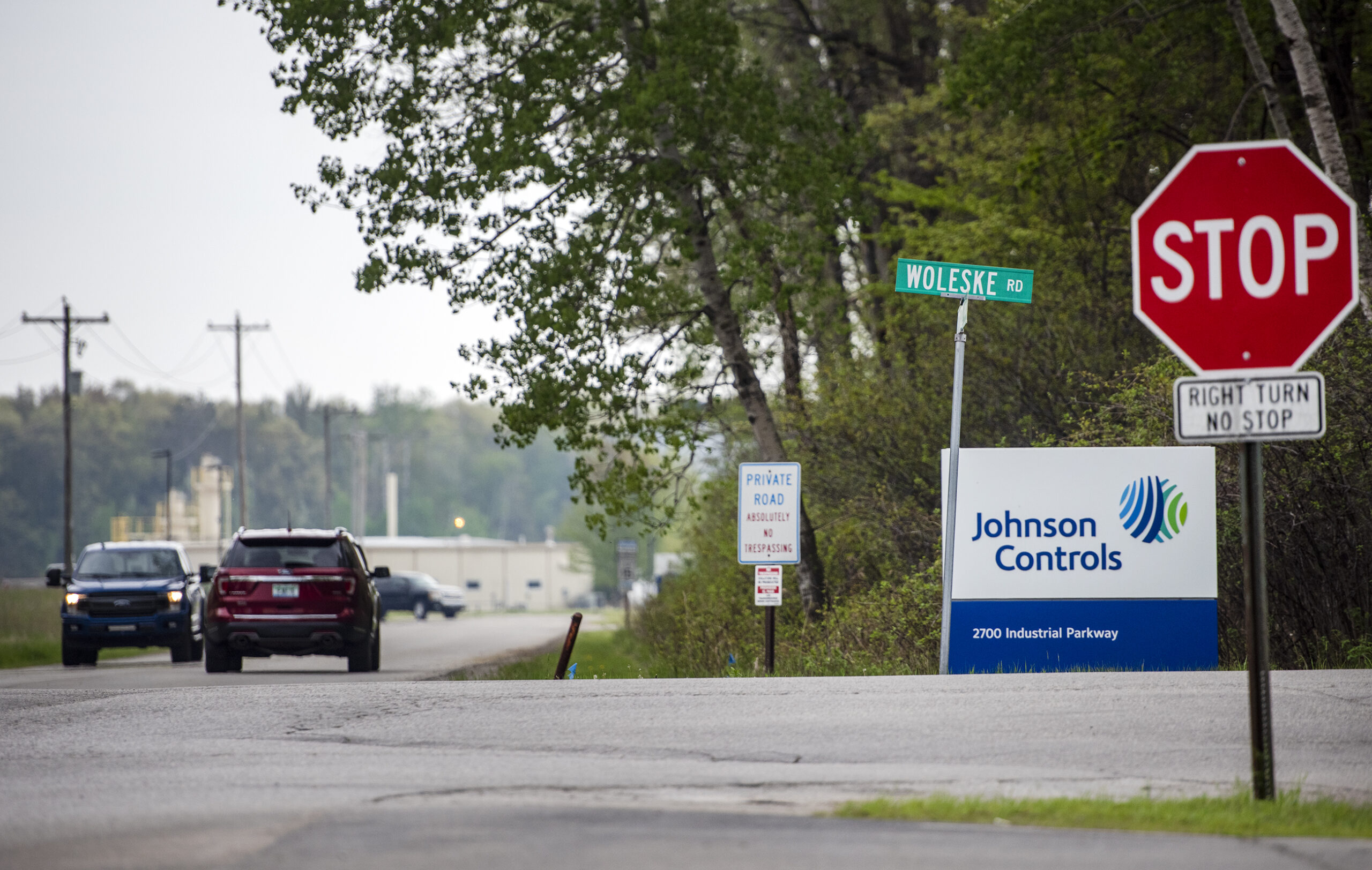
In December last year, the DOJ notified Tyco and Johnson Controls that it may pursue civil enforcement action against them. Wisconsin Attorney General Josh Kaul declined to comment on any enforcement action that may be taken against Tyco and Johnson Controls, saying it’s an ongoing matter. He noted many cases referred to the DOJ are resolved prior to filing any civil lawsuits while other cases require action.
“We take our environmental enforcement obligation at the Department of Justice very seriously, and one thing that is very clear to me having been to Marinette is that the PFAS contamination that’s taken place there has caused serious harm to people in that community,” said Kaul.
Kaul has supported the U.S. Environmental Protection Agency as it moves to regulate the chemicals, calling for more restrictive standards to protect public health and widespread testing. The federal agency has yet to set a national standard in drinking water, but it currently has a federal health advisory level of 70 parts per trillion.
Tyco has said at the time they didn’t believe PFAS contamination had migrated offsite.
“Everybody knows that groundwater moves,” said Lamont.
Now, about every two months, Lamont receives six Culligan bottled water containers paid for by Tyco. The company also funded installation of a water filtration system in his home, and the filters need to be changed every six to nine months. The solution is only temporary, and Tyco and Johnson Controls have said they’re willing to pay for extending a water line from the city of Marinette to the town.
“The fault for not getting extension to water, I would have to put with the Town of Peshtigo,” said Lamont.
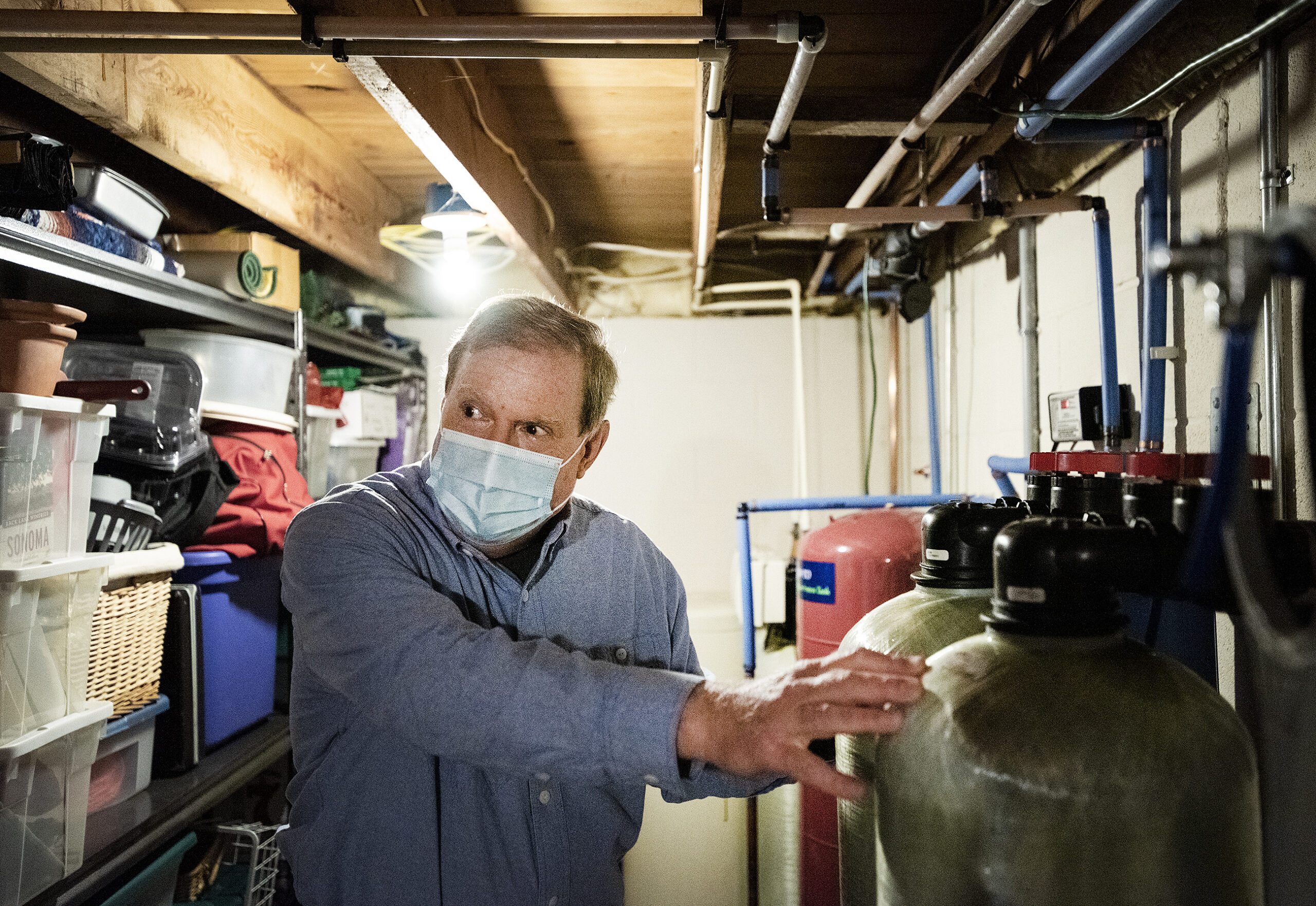
The town passed a resolution last fall to pursue negotiations with the city on a water line, but he said town officials kept kicking the can down the road. Tyco and Johnson Controls paid for an independent engineering consultant to evaluate all options for the town. Katie McGinty, chief sustainability officer for Johnson Controls, said in May that the water line is the best option.
“This time next year, we could have clean water flowing through a new municipal water line,” said McGinty.
But, it’s not as simple as putting pipes in the ground. Building a water line would require annexing the town to the city. Marinette City Council member Doug Oitzinger said not all Peshtigo residents were thrilled with that idea because they would likely face higher taxes, water bills and more regulation. Questions also remain about who would bear the responsibility and costs to own, operate and maintain the water line.
“I think it’s very unwise for the city to own and operate a water line in somebody else’s jurisdiction,” said Oitzinger. “It is fraught with problems.”
[[{“fid”:”1544591″,”view_mode”:”embed_landscape”,”fields”:{“alt”:”Marinette City Council Member Doug Oitzinger”,”title”:”Marinette City Council Member Doug Oitzinger”,”class”:”media-element file-embed-landscape media-wysiwyg-align-right”,”data-delta”:”9″,”format”:”embed_landscape”,”alignment”:”right”,”field_image_caption[und][0][value]”:”%3Cp%3EMarinette%20City%20Council%20member%20Doug%20Oitzinger%20stands%20over%20a%20ditch%20flowing%20into%20Green%20Bay%20on%20Thursday%2C%20May%2020%2C%202021%2C%26nbsp%3Bwhere%20water%20samples%20have%20shown%20PFOS%20levels%20as%20high%20as%202%2C000%20parts%20per%20trillion%20before%20it’s%20treated.%20%3Cem%3EDanielle%20Kaeding%2FWPR%3C%2Fem%3E%3C%2Fp%3E%0A”,”field_image_caption[und][0][format]”:”full_html”,”field_file_image_alt_text[und][0][value]”:”Marinette City Council Member Doug Oitzinger”,”field_file_image_title_text[und][0][value]”:”Marinette City Council Member Doug Oitzinger”},”type”:”media”,”field_deltas”:{“9”:{“alt”:”Marinette City Council Member Doug Oitzinger”,”title”:”Marinette City Council Member Doug Oitzinger”,”class”:”media-element file-embed-landscape media-wysiwyg-align-right”,”data-delta”:”9″,”format”:”embed_landscape”,”alignment”:”right”,”field_image_caption[und][0][value]”:”%3Cp%3EMarinette%20City%20Council%20member%20Doug%20Oitzinger%20stands%20over%20a%20ditch%20flowing%20into%20Green%20Bay%20on%20Thursday%2C%20May%2020%2C%202021%2C%26nbsp%3Bwhere%20water%20samples%20have%20shown%20PFOS%20levels%20as%20high%20as%202%2C000%20parts%20per%20trillion%20before%20it’s%20treated.%20%3Cem%3EDanielle%20Kaeding%2FWPR%3C%2Fem%3E%3C%2Fp%3E%0A”,”field_image_caption[und][0][format]”:”full_html”,”field_file_image_alt_text[und][0][value]”:”Marinette City Council Member Doug Oitzinger”,”field_file_image_title_text[und][0][value]”:”Marinette City Council Member Doug Oitzinger”}},”link_text”:false,”attributes”:{“alt”:”Marinette City Council Member Doug Oitzinger”,”title”:”Marinette City Council Member Doug Oitzinger”,”class”:”media-element file-embed-landscape media-wysiwyg-align-right”,”data-delta”:”9″}}]]
Oitzinger supports the idea of the city selling bulk water to Peshtigo. He said the town could create its own water authority to oversee operations and maintenance of the water line, which would also require approval from the Wisconsin Public Service Commission. Now, the issue may be moot after the Marinette City Council passed a resolution against extending water to the town in July.
Prior to the vote, Marinette Mayor Steve Genisot said he shared questions about operation, maintenance and long-term distribution of water and how far the line would extend. But, he said there hadn’t been any discussion with the town in months.
“We’ve got our own separate issues that the city is dealing with, with this contamination issue, and that includes everything from construction to road projects to the wastewater,” said Genisot.
The city has also been impacted by small traces of the chemicals in its drinking water and has been working with Tyco to address PFAS in biosolids, or treated sewage sludge, at its wastewater treatment plant. Tyco previously spent $3 million to help the city test, treat, remove and dispose of its biosolids. The city’s mayor wouldn’t speak further about the resolution.
The city council’s vote dashed hopes among some Peshtigo residents that fresh faces on the town board would move Peshtigo closer to negotiating a permanent water solution with Marinette. Cindy Boyle, the Town of Peshtigo’s newly elected board chair, had been working to hire a municipal lawyer and obtain legal files regarding previous work with Tyco on the contamination since she took office in April. She had already begun the process of setting up a meeting between the city, town, DNR and Tyco to begin discussing options. When she learned of the resolution, Boyle asked the mayor and council to reconsider.
She said the vote was unexpected and disappointing.
“If the city for some reason reconsiders, that would be lovely,” said Boyle. “I think the more options that you have, the better, but we have other options.”
Those options include reaching out to the city of Peshtigo for water, she said.
The city of Marinette will revisit the resolution on Wednesday, Aug. 4.

Whatever the solution, Tyco still needs to identify how far the contamination goes and who needs clean water, according to Christine Haag, the DNR’s director of remediation and redevelopment.
“We don’t believe that we have the answers to those questions yet,” said Haag. “I don’t think the DNR has those answers, and we’re not sure that (Johnson Controls) has those answers, either.”
Tyco and Johnson Controls dispute that, saying they’ve defined the scope of contamination. They refused regulators’ demand to sample wells in a wider area surrounding Tyco’s facility last fall. The DNR hired an engineering firm to conduct testing of 415 more wells, the majority of which show PFAS levels below the state’s recommended standard.
Tyco and Johnson Controls have been moving forward with plans to build a system that will pump and treat contaminated groundwater to reduce further spread of PFAS from the site after receiving conditional approval from state regulators. The DNR warns that system will reduce, but not eliminate, the chemicals in groundwater and surface water over the next 30 years.
Johnson Controls’ McGinty said in a recent statement that the difficult process of figuring out a permanent source of clean water for residents always has twists and turns.
“As always, Tyco is eager to participate and advance discussions leading to delivery of a permanent source of clean drinking water to our impacted neighbors,” she said.
The DNR will now hire and oversee a facilitator, which will be paid for by Tyco, to help move those discussions forward. The hope is to bring all stakeholders together to begin the conversation sometime this fall.
McGinty said the company takes full responsibility for their actions as they seek a permanent water source.
“We don’t want to impose a financial burden as we’re fixing the water burden that people have been dealing with,” said McGinty.
Kayla Furton agrees that responsibility should lie squarely with Tyco and Johnson Controls.
“The taxpayers should not have to foot the bill of the contamination that this corporation has made billions profiting off of,” she said.
Despite setbacks, Peshtigo leaders remain optimistic. Furton said they’re holding out hope for a solution.
“If we focus on the positive outcome, which is clean water for everyone, I think we’ll get there,” she said.
She just doesn’t know how much longer they’ll have to wait.
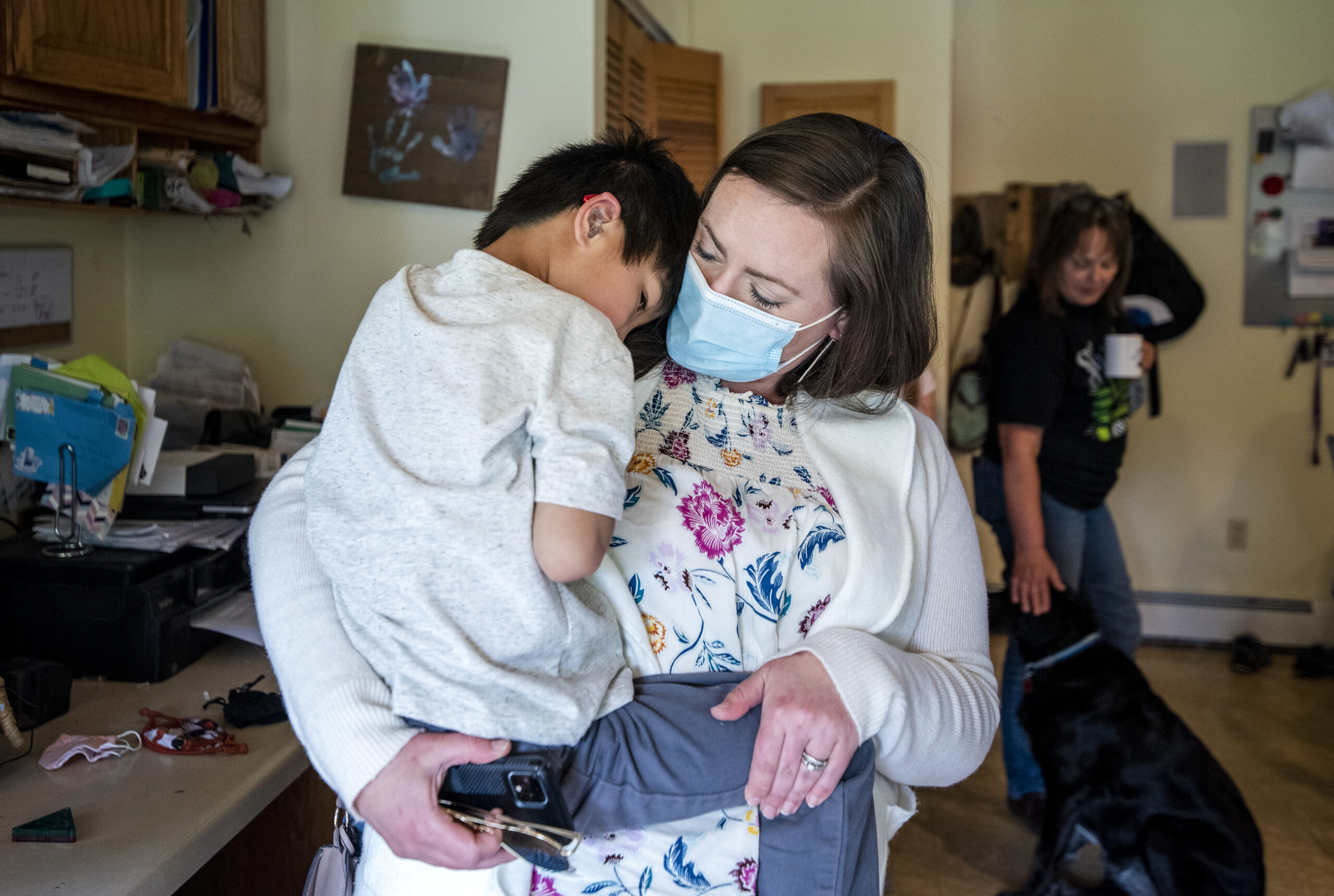
This story is part of a two-part series on PFAS contamination across the state. Read more from WPR’s Hope Kirwan on the state of PFAS contamination on French Island and what its residents are doing to get clean water.
Wisconsin Public Radio, © Copyright 2026, Board of Regents of the University of Wisconsin System and Wisconsin Educational Communications Board.

